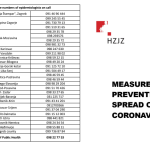The samples for the testing were taken in Zagreb and in the northern cities of Varazdin and Cakovec and the sequencing of the genomes was conducted at the start of the second wave of the coronavirus pandemic, that is from August to November 2020. Also, some of the relevant testing was conducted in early December.
The project is being led by Kristian Vlahovicek, a professor at the University of Zagreb Faculty of Science.
The purpose of the project is to establish the connections between the genetic basis of the virus and the development of more serious symptoms of the COVID disease in some patients.
The first stage of the project lasts until the end of 2021.
Vlahovicek said that the good news was that those 60 sequenced genomes found by researchers did not match the fast-mutating strain detected in England in November 2020.
However, the professor underscored that the findings did not mean that that variant was not present in Croatia, but in the event that it spread to Croatia, it had not been a dominant variant.
On the other hand, 30% of the samples analysed showed mutations matching the variant of the virus in Scotland, found there in August.
The professor said that this mutation was perceived to be connected with faster spreading of the virus and not with development of serious symptoms.









